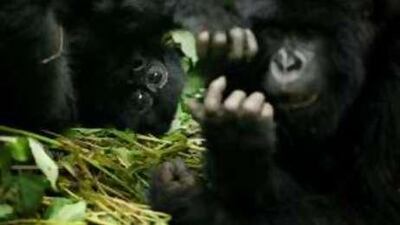DR CONGO // Mapuwa is asleep when the rangers arrive. It took these rangers an hour hacking with machetes through thick jungle up the side of a volcano to track down Mapuwa and his family of 14 mountain gorillas.
Now the rangers grunt to alert Mapuwa to their presence. If the giant silverback is startled, he could become agitated. Three young gorillas emerge from the jungle and begin wrestling with each other. One playfully bites another's ear as they tumble down a hill. Another climbs on top of a pile of leaves and beats his chest just two metres from where the rangers watch. Mapuwa, the 30-year-old patriarch of this family, finally awakens from his slumber under a thick patch of bush. He trots off into the forest to look for a snack as a pregnant female follows. Another female with a baby on her back is close behind, followed by a few adolescent gorillas. The three playful children bring up the rear.
The rangers watch these animals wander into the bush before heading back down the volcano to their base. These are some of the few dedicated rangers who have stayed on to protect the gorillas since this territory was taken over by rebels fighting in the Democratic Republic of Congo's civil war. "Because I was born in a village near here, I have to protect this forest," said Jonas Harerimana, who is paid US$10 (Dh36) per month by a conservation group.
The Virunga National Park, 810 hectares of virgin rainforest and volcanoes in eastern DR Congo, is Africa's oldest wildlife preserve. It is also one of the only habitats of the mountain gorilla. About 700 mountain gorillas remain, and all live in the wild jungles of DR Congo, Rwanda and Uganda. Mountain gorillas have not survived in captivity, and only the more abundant lowland gorillas are found in zoos.
Virunga is the home of nearly half of the total mountain gorilla population. It is also the home of the National Congress for the Defense of the People (CNDP), a rebel group that has occupied this area for the last year. When the rebels took over the territory, most of the rangers from the government-run wildlife service fled the area. Those that remained are considered to be working for the rebels.
"The ICCN [the Congolese wildlife service] refused to work with us because we are rebels," said Canisius Kanamahalagi, a conservationist working for the rebels in the gorilla sector of the park. "They decided to take all the rangers and said whoever works here is considered a rebel." The CNDP rebels said they are doing a better job of conserving the wildlife in the park than the government did. Virunga has the unique distinction as the only place in the world where guerrillas are protecting gorillas.
"We are the first to protect the gorillas," said Seraphin Mirindi, the CNDP spokesman. "As we are protecting humans, we are also protecting gorillas." The CNDP, a Tutsi militia led by Gen Laurent Nkunda, claims to be protecting its people from Hutu militias in eastern DR Congo. The gorillas draw a lot of tourist dollars in central Africa, and gorilla tracking is a big business in Rwanda and Uganda where tourists pay up to $500 to spend one hour with the wild gorillas.
Since the rebels have controlled the gorilla sector in DR Congo, the Congolese government has lost this considerable revenue. The rebels have started taking tourists to see the gorillas, although the government blocks tourists travelling to the gorilla sector from government-controlled territory. The few tourists who see the gorillas in Congo come across the Ugandan border, which is controlled by the rebels.
Visiting the gorillas in DR Congo is controversial. Conservationists said the rebels are detrimental to the health of the park, and they said trips to see the gorillas in DR Congo support the armed group. Emmanuel de Merode, the former director of Wildlife Direct, a conservation organisation, wrote in a blog recently about the ethics of visiting the gorillas in DR Congo. "We cannot under any circumstances play a part in the atrocities of North Kivu by helping to fund the rebels," he wrote.
"While we can't stop anyone from paying $300 to visit the gorillas, I would urge you to think very carefully about the consequences of funding the rebel administration before doing so." Mr de Merode, a Belgian, took over this week as the director of Virunga National Park. Last year, rebels were accused of killing and eating the meat of two gorillas in the park. The rebels blamed the killings on local villagers. This caused an international outcry, and Mr Nkunda, who likes to promote himself as a benevolent warlord, gave strong orders to his soldiers to leave the gorillas alone.
"In Congo, a thousand people can die and no one cares, but kill two gorillas and the international community is outraged," said Bruno Hügel, a conservationist at the World Wildlife Fund in Goma. With the ongoing conflict in DR Congo and the presence of armed groups in the park, the rangers, who are protecting the gorillas, have dangerous jobs. About 120 rangers have lost their lives in the last decade due to the armed conflict.
Even if they do not see the inherent value in protecting wildlife for nature's sake, the rangers understand that the gorillas bring in tourist dollars, which are much needed to rebuild this war-torn country. "We know the importance of the gorillas," Mr Harerimana said. "The gorillas bring tourists, which contributes to the development. If there are no visitors, it means we are isolated." @Email:mbrown@thenational.ae

